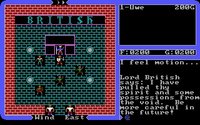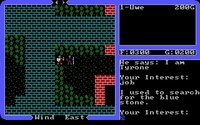|
|

|
PLATFORM
|
PC
|
BATTLE SYSTEM
|

|
INTERACTION
|

|
ORIGINALITY
|

|
STORY
|

|
MUSIC & SOUND
|

|
VISUALS
|

|
CHALLENGE
|
Moderate
|
COMPLETION TIME
|
20-40 Hours
|
|
OVERALL

|
+ Unique concept.
+ Virtue system is quite interesting.
+ Graphics and certain mechanics are quaint...
- ...but also feel archaic.
- Battles can become tedious.
- No music and irritating sound effects.
|
Click here for scoring definitions
|
|
|
While I was raised on console Japanese RPGs, I've always had a fascination with older video games and their history. I knew for some time that a few of the longest running Japanese RPG franchises such as Dragon Quest and Final Fantasy were influenced by early Western RPGs, like the first Wizardry and Ultima games. I've been curious about playing these classics, but I also knew that they would probably feel awkward and unfamiliar to me. Despite this, my curiosity got the better of me, and I obtained and learned how to run Ultima IV: Quest of the Avatar on a modern PC. It is an intriguing game, with some traits that are unique even by today's standards. However, its archaic mechanics take some getting used to and can be irritating at times.
With the age of darkness finally over, the people of old Sosaria, now christened Britannia by its benevolent ruler Lord British, can finally know peace. The people have long experienced terror and are only recently starting to search for spiritual enlightenment. To help them, Lord British devises the Eight Virtues, a philosophical path that focuses on living a selfless, righteous life. Lord British feels that people need a role model, a sort of living embodiment of these virtues called the Avatar. A candidate comes in the form of a visitor from another world, who answers Lord British's call to take up the quest.
 You really couldn't get all of my gold back, Lord British?
You really couldn't get all of my gold back, Lord British?
|
|
Ultima IV has an interesting opening, with the player finding a strange portal, then encountering a gypsy at a sort of fair. She reads the player's fortune by asking moral conundrums, determines which of the Eight Virtues the player embodies the most, and subsequently sets his/her class. From then on, however, the game's story is largely nonexistent. While there are many objectives to be met in order to complete the game, not much in the way of direct narrative accompanies these tasks. Although the party members have set names, they display little in the way of personality and have no dialogue outside of when the player character recruits them into the party. The NPCs do shed some light onto the goings-on in the world, and the manual and clue book (included as PDFs with downloads of the game) also provide some background on the world of Britannia. Of course, with a game of this age and nature, the light story is understandable. With the game's open world, the player makes her/his own story in a sense. Those who are used to or prefer more substantial stories may not find the game to his/her liking.
The combat system is loosely reminiscent of a strategy RPG. Each turn, a party member can move one space, attack, cast a spell, or use an item. To initiate any of these actions, the appropriate key needs to be pressed, such as A for attack or C to cast magic, then an arrow key pressed in the desired direction, or a number if the action is being performed on a party member. Although this makes combat fairly involving, it also tends to make battles long, especially after the party increases to its full size of eight members. Though encounters can be seen on the overworld, it is hard to avoid them. Even going into a town, castle, or dungeon won't shake the creatures off as they'll still be waiting outside. Furthermore, while it is fairly easy to run away from battles, this action is seen as cowardly when the party isn't gravely injured, making the player lose Valor, even partial avatarhood in the virtue should the player have obtained it. This combination of long battles, difficulty avoiding encounters, and the discouragement to flee from fights can make combat feel very tedious, if not irritating.
While the use of magic in battles is straight forward, the means to create magic is not. Spells must be prepared before a fight by combining items called reagents. Though the player is given a small amount of reagents at the beginning of the game, it may be difficult to obtain more until the player learns which towns sell them. Spells can only be mixed one at a time, which may become monotonous.
Being an old computer RPG, Ultima IV is entirely controlled by the keyboard, which may feel unusual to those used to mouse controls or a console controller. This should change once one is familiarized with the list of key commands. Talking to NPCs is quite interactive, even if it's limited. The player can have a brief conversion with characters by typing in a word or phrase. Most NPCs respond to "name" and "job," and the player can guess which other words will get more out of the characters from their responses. Some conversations can even build or decrease certain virtues. It's an interesting system, but it may get cumbersome when unable to guess what other words will get the NPC to respond.
 ...So once you found the stone, you no longer had a job?
...So once you found the stone, you no longer had a job?
|
|
While there are battles aplenty, the means through which the player becomes the Avatar is what truly makes Ultima IV unique. Obtaining "virtue points" lays at the heart of this path of righteousness. Avatar-to-be is urged to do as much good as he/she can. While some means of virtuousness are obvious, such as giving money to beggars for Compassion, others are more obtuse, like finding key items for Honor. A player may also unknowingly do something seen as un-virtuous, such as killing "non-evil" creatures like snakes, which are supposed to be left alone. Aside from earning "virtue points" by performing the appropriate acts, players need to collect each virtue's rune found hidden in its corresponding town. With rune in hand and virtue maxed out, the player then needs to meditate at the matching shrine and recite (type) the necessary mantra to become a partial avatar in said virtue. Once one is a partial avatar in all eight virtues, and with certain special artifacts in her/his possession, the player needs to enter the Great Stygian Abyss to read from the Codex of Ultimate Wisdom and become a full Avatar. While finding special items is nothing new to RPGs, seeking them out as part of a journey of enlightenment and self-betterment is an original idea and an intriguing change of pace from most other RPGs. It can be very difficult to figure out where to find needed items, places, mantras, and the like. Various NPCs provide clues and helpful information, but it may be equally hard to find these characters or get them to state the needed information.
Ultima IV's graphics style appears primitive, almost comically so. Human characters are stick figures, liches look like evil turnips, and demons look like giant bats. The color palette is also rather limited, though human, animal, and monster sprites are animated. It is a style that takes some getting used to if one hasn't experienced it before, but it's understandable considering that the game came out in 1985. Some people may even find the visual style charming. As for the music, there sadly isn't any. Every version of the IBM-PC port lacks the music from the Apple II and other early editions of the game. While fan patches do exist to put the music back into Ultima IV, official downloadable releases lack them. In its unaltered form, this version of the game feels awkward without music, and with only the occasional, often grating sound effects in the background.
To be sure, Ultima IV shows its age. This game was perhaps not the best choice for an introduction to the world of PC RPGs, but I did enjoy my time with it. True, I found the lack of music off-putting and the battles to be tedious, but I still found playing this classic to be a fascinating experience. Ultima IV will not appeal to everyone, but those who are willing to look past or get accustomed to the archaic/unfamiliar mechanics and design may find this game enjoyable. Ultima IV has a unique premise and is a reminder that RPGs don't have to have even the most ubiquitous of basic plots.
Review Archives
|









